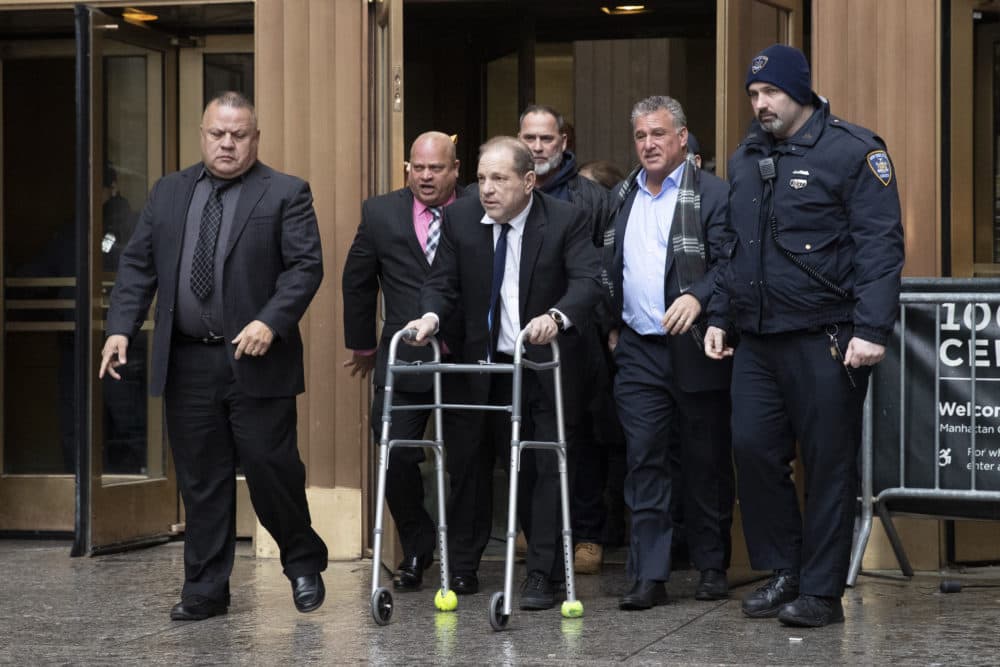Advertisement
Commentary
Harvey Weinstein Won’t Pay Or Admit Guilt. How Is This Justice?

You’ve got to hand it to Harvey Weinstein and his legal team. After bullying an untold number of women over two decades into signing non-disclosure agreements to settle complaints of sexual harassment, assault and rape against him, Weinstein has offered 30 women the kind of deal that might make you feel compromised and gross.
This has been Weinstein’s pattern behind closed doors and we are seeing a version of it in public now. The settlement gathers together civil complaints against Weinstein ranging from sexual harassment to rape by 30 actresses and former Weinstein Company employees. Instead of taking responsibility and admitting wrongdoing, he and the board of his now-bankrupt company have offered a settlement in which he admits nothing and the bill is footed by insurance.
This is a good outcome for Weinstein, but it shows how hard it is for survivors to receive justice. Even in the glare of the #MeToo movement’s highest-profile case, Weinstein’s victims will not be able to add the word “admitted” to the abuse he committed against them.
This settlement is an extension of his abuse through the instrument of the law. Once again, Weinstein is deciding how this story (or at least this part of the story) ends.
Predictions that #MeToo would go too far, by “endangering due process” for accused men, has not come to pass, even as it has remained a talking point. This grave concern for abusers obscures the fact that survivors of all genders are routinely silenced in the workplace and at home, in athletics and places of worship, in their efforts to report and gain justice. This is the real failure of due process.
This settlement is an extension of his abuse through the instrument of the law.
In “She Said: Breaking the Sexual Harassment Story That Helped Ignite a Movement,” Jodi Kantor and Megan Twohey (who with Ronan Farrow won the Pulitzer Prize for public service for their reporting on Weinstein) document decades of Weinstein’s predatory behavior. They rigorously fact-check the accounts of women he abused, threatened with retaliation and coerced to sign nondisclosure agreements. Kantor and Twohey also expose how attorney Lisa Bloom used her knowledge of the vulnerabilities of abuse victims to help Weinstein coerce them into shutting up and going away.
Instead of admitting guilt and taking responsibility, he has decided to coerce his accusers one more time. He has persuaded the women and their attorneys that their only hope for compensation for their disrupted lives and the derailed careers he caused, is to agree to his terms. This $25 million settlement is like a sexual predator’s personal non-disclosure clause: He won’t pay. He won’t admit guilt.
It’s a reminder that Weinstein has been emboldened by his enablers, and the law, for decades.
The New York district attorney never charged him with the sexual assault of Ambra Battalana Gutierrez, even though they had him — on tape — admitting to the attack.
Weinstein’s board of directors covered for him by authorizing settlements, his attorneys pressured women into taking those settlements and signing NDAs, and none of them stopped Weinstein. He abused scores of women with the assistance of a legal system that gives the benefit of the doubt to those accused of sexual assault and refuses to extend it to women.
Given the law’s frequent indifference to survivors, and Weinstein’s skill at bending it to serve his sexual predation, many of the plaintiffs will agree to this settlement because after decades of suffering and two years of legal wrangling, this is the best resolution they can expect.
In addition, many of Weinstein’s victims can no longer file independent civil or criminal complaints, because of how long he succeeded in keeping them silent. Antiquated statutes of limitations allow Weinstein to run out the clock. One example: Katherine Kendall, 50, was sexually harassed by Weinstein when she was 23. She told the Times that although she finds the settlement unsatisfying, she chose not to block the other plaintiffs by contesting it further. The settlement, as she describes it, disturbingly replays Weinstein’s bullying and threats through legal means: “I don’t love it, but I don’t know how to go after him. I don’t know what I can really do.”
Justice that feels like the continuation of abuse is hardly justice.
From another perspective, the settlement is a fire sale: Weinstein’s company is bankrupt and Weinstein is threatening personal bankruptcy. This may be the only chance these women have to offset lost income or be compensated in any way. When the settlement was initially announced, the payout was $90 million. Once Weinstein's company declared bankruptcy and his creditors lined up, the amount shrank to $25 million, with a sizable portion going to the plaintiffs' attorneys. Even in these circumstances, his board has insured terms favorable to themselves: the board members are insulated from further liability. No one says they’re sorry. Case closed.
However, as the civil case closes, Weinstein’s criminal trial, involving charges of sexual assault of two women, begins in Manhattan in January. If convicted, Weinstein faces jail. Other women who have not joined the civil suit currently being settled, could also sue Weinstein. None of the actresses associated with breaking the Weinstein story — including Gwyneth Paltrow, Angelina Jolie, and Salma Hayek — are joining the settlement. Ashley Judd, for one, has announced her intention to sue Weinstein.
The Weinstein settlement demonstrates how difficult it is for victims to get justice. The law favors rich and powerful men; the courts disadvantage victims and protects abusers. This is bias and it goes far beyond preserving due process.
Justice that feels like the continuation of abuse is hardly justice.
